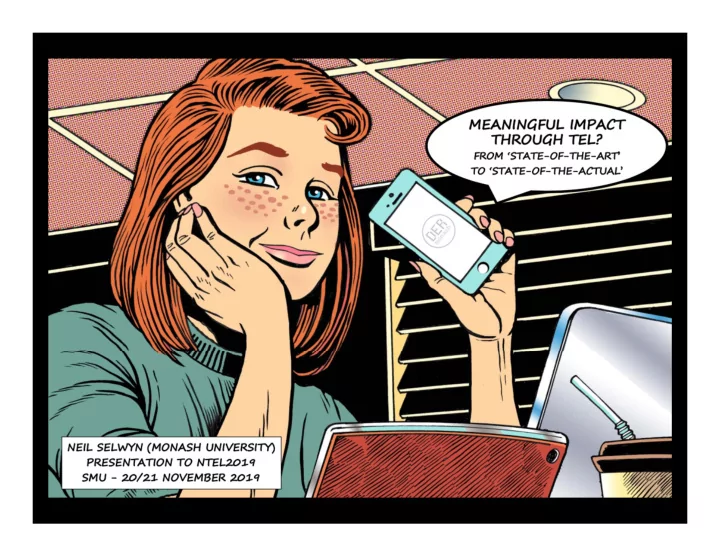

<this slide is intentionally blank>
idealistic
realistic
state of the art
state of the actual
<nothing to see here>
‘It’s Complicated’
<nothing to see here>
Being constructively critical
#1. LANGUAGE MATTERS!
TECHNOLOGY ENHANCED LEARNING
TECHNOLOGY ENHANCED LEARNING
TECHNOLOGY ENHANCED LEARNING
TECHNOLOGY ENHANCED LEARNING
MEANINGFUL IMPACT
MEANINGFUL IMPACT
MEANINGFUL IMPACT
seeing ‘TEL’ in sociotechnical terms
Technology Enhanced Learning Technology Facilitated Studying Virtual Learning Environment Student Management System Learning Analytics Learning Surveillance
#2. CONTEXT MATTERS!
What forms of digital technology use do undergraduate students report as being notably helpful or beneficial in terms of their university studies? What are the characteristics and contexts of students’ beneficial technology use? What meanings and wider connotations related to university study and the student experience are associated with these perceived benefits?
I’m not a morning person. Having online lectures helps me with time management because I can fit the lecture when I can (829). ‘Video Lecture’ enables me to access online lectures if I am unable to attend lectures on campus. To be completely honest I have only attended one lecture on campus and very rarely use ‘Video Lecture’ but it is definitely the most USEFUL service. (523)
To what extent is Wikipedia being used - and valued as useful - by undergraduate students? How does Wikipedia use and usefulness vary between different groups of students e.g. in terms of subject disciplines, age and stage, gender, educational attainment, cultural and linguistic diversity and so on? What role can Wikipedia be said to play in the academic lives of undergraduate students?
University attended: respondents from University A were 1.75 more likely to report finding Wikipedia useful than those from University B; Year of study: fourth/final year students were more likely to report finding Wikipedia useful (1.0) when compared to students in Year one (0.39), Year Two (0.73), and Year Three (0.67); Subject of study: students studying any subject than Education were more likely to report funding Wikipedia useful – i.e. Medicine (3.61), Sciences (4.09), Engineering (4.75), Business (2.69), Social Sciences (3.10), Law (2.46), Humanities (3.43), Creative Arts (4.56); Traditional age students: (i.e. aged 20 years or less at entry) – were 1.93 more likely to find Wikipedia useful than mature aged students (i.e. aged 21 years or more at entry); Working in paid employment: those also working in part-time paid employment were 1.58 more likely to report finding Wikipedia useful than those not working; Amount of paid employment: 6 to 10 hours a week (1.70); 11 to 20 hours (1.03) and more than 20 hours (1.04).
An entry-level initial introduction to a topic or area of study “I think usually uni readings are overcomplicated and do not explain things very straightforwardly. Wikipedia explain concepts clearly so that I am more able to understand the uni readings” (F, Uni A, STEM) An unofficial source of clarification & interpretation “For example, in sociology, some of the theories that you get, they’re just worded so weirdly and you just don’t understand what it means. So you just go to Wikipedia just to get a simple definition of what it is and an example of it. Then I can relate to what the author actually said” (M, Uni A, Non-STEM)
A bibliographic source “I don’t cite Wikipedia … but I use the citations that they have there” (F, Uni A, non-STEM). A last minute over-reliance lower-level “ simple tests, where you just have to remember content” (M, Uni A, non-STEM).
What forms of technology use are seen by undergraduate students as unhelpful, and why? What meanings and wider connotations are associated with these perceived ‘downsides’? Is there an increased sensitivity or vulnerability to these forms of technological ‘failure’ amongst particular groups of students?
so what?
How many of our ‘TEL’ concerns are not about technology … but about reforming our institutions? How many of our ‘TEL’ concerns are related to issues outside of the university and/or the ‘learner’? Is ‘good enough’ TEL all that can possibly be achieved? Should we be spending more time acknowledging the things that EdTech cannot do … and exploring how else these things might be achieved?
so what now?
<nothing to see here>
Recommend
More recommend